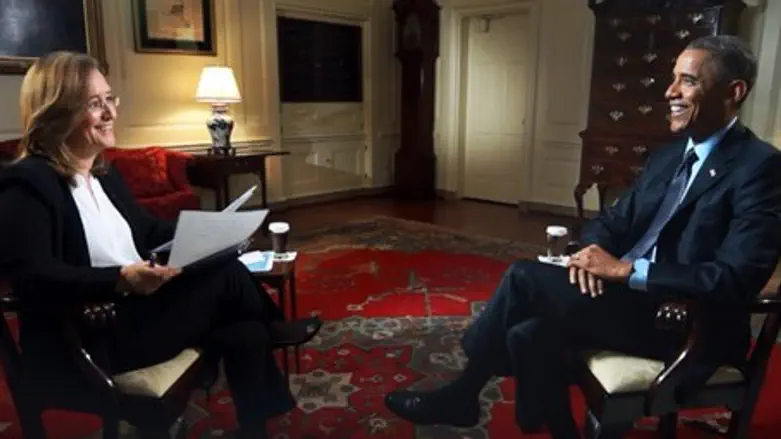
Much has been said about US President Barack Obama's recent threat to consider changing the long-standing American policy of vetoing anti-Israel UN resolutions. But little attention has been paid to another point he made on the same occasion: A strong hint that American military action against Iran was no longer an option.
In his recent interview with prominent Israeli TV interviewer Ilana Dayan, Obama said, "A military solution will not fix [the threat of Iran's nuclearization], even if the United States participates. It would temporarily slow down an Iranian nuclear program, but it will not eliminate it."
The Zionist Organization of America (ZOA) announced that it was "shocked and deeply critical" of Obama's words. The ZOA declared that this statement by Obama "contradicts his repeated commitments since before becoming president that 'all options are on the table' in seeking to prevent Iran from becoming a nuclear power."
Obama told Dayan, "I can, I think, demonstrate - not based on any hope, but on facts and evidence and analysis - that the best way to prevent Iran from having a nuclear weapon is a verifiable, tough agreement" – as opposed to a "military solution." In response, the ZOA commented: "Clearly, when the President publicly states that a course of action would be ineffective, he is, in essence, removing it from the list of options of what he is prepared to do."
ZOA National President Morton A. Klein said, "By saying that military action against Iran to prevent it from becoming a nuclear power would be at best only temporarily effective, President Obama not only made a debatable claim - he essentially contradicted his repeated, publicly stated commitment since before becoming president that he would not remove the military option from the table. But now, President Obama has telegraphed to the world that he has done just that."
Klein said that Obama's condemnation as only a "temporary" solution "makes little sense," from more than one standpoint: "Military action would not only prevent Iran becoming nuclear for years, but would also probably serve to destabilize the Iranian regime. Conversely, a nuclear Iran would serve to make the current regime impregnable to international pressure and strengthen its hold and reach in the Middle East."
On the other hand, "the President says military action is a temporary measure that won't 'eliminate' Iran's nuclear weapons program. Yet, by his own admission, a nuclear deal with Iran would also be only a temporary measure – for after 13 years, even if Iran faithfully implements the deal yet to be signed, it would be able to acquire nuclear weapons. Clearly, the diplomatic approach would also be only 'temporarily effective,' yet he has not ruled out a diplomatic solution on that account."
The ZOA noted that Israel had been tremendously successful in its military strikes against Iraq's nuclear reactor in 1981 and against Syria's nuclear facility in 2007.
Finally, the ZOA notes, even from a diplomatic vantage point, "President Obama also made a grave tactical error. Surely, the maximum of pressure will be required to obtain a genuinely worthwhile nuclear agreement with Iran. How can such pressure be applied now, once President Obama has said that the military option is no real option at all. Iran, now, need not fear American military action if it fails to meet the decreasing demands that are being made of it in negotiations."
